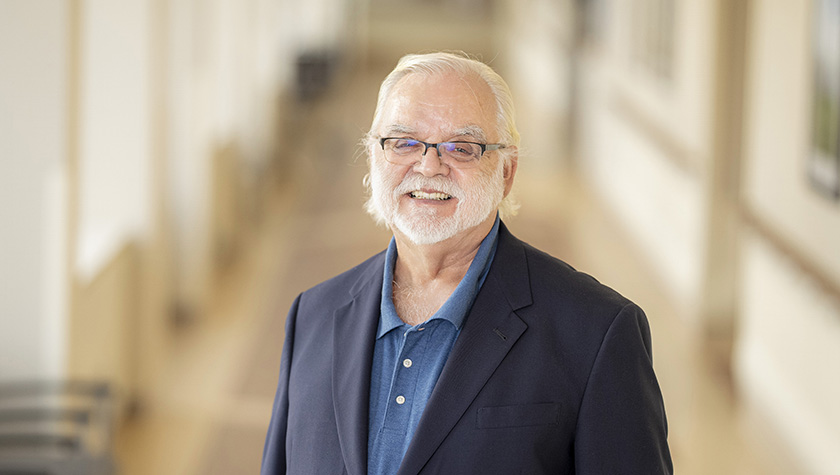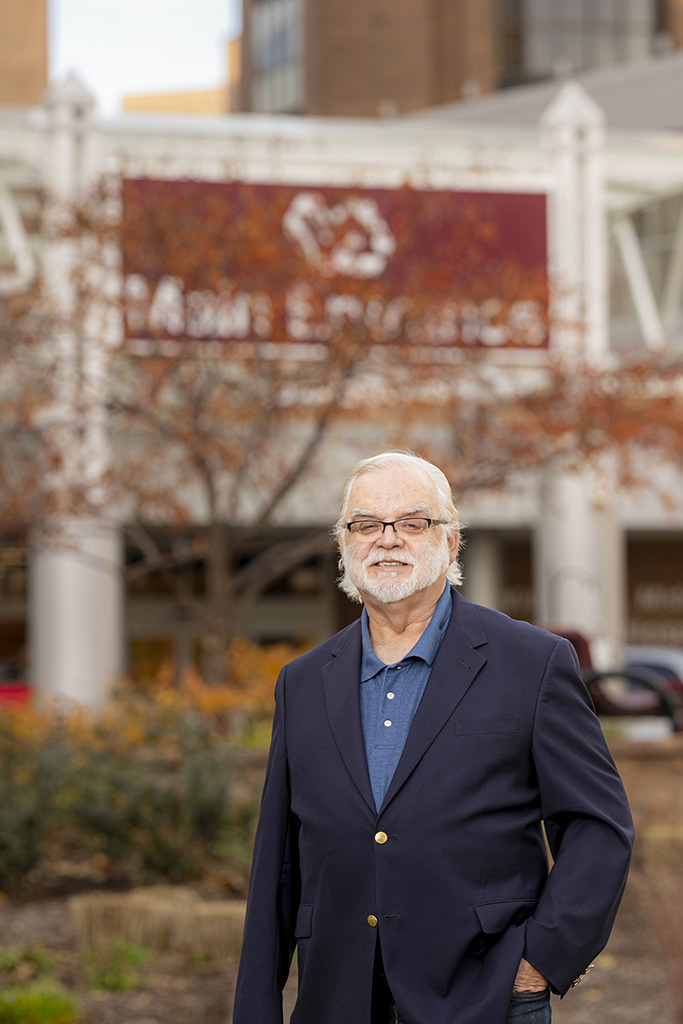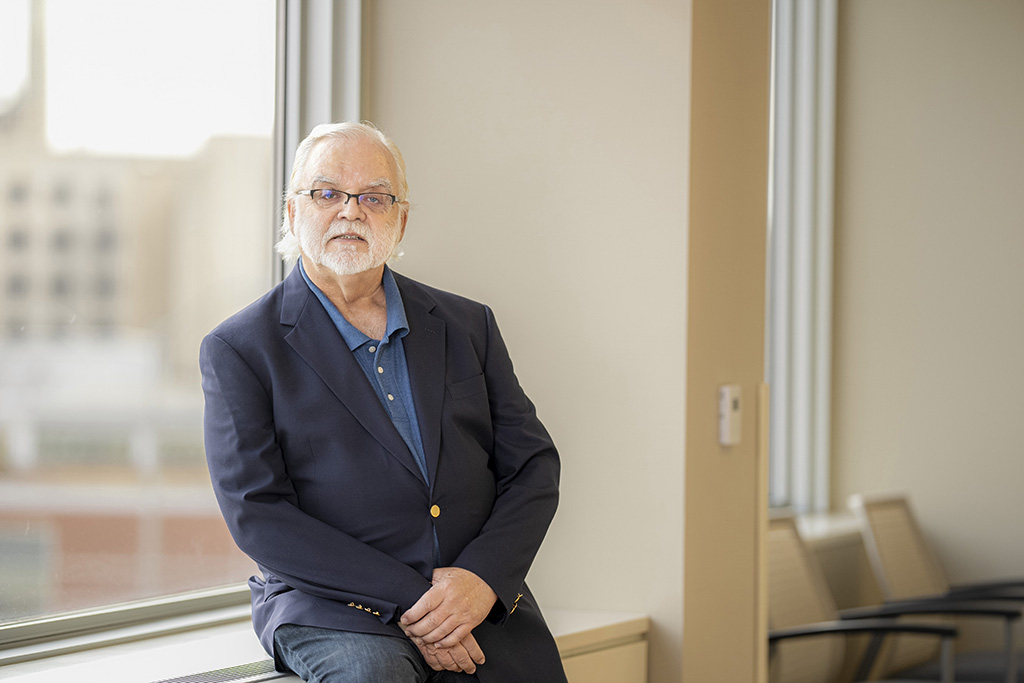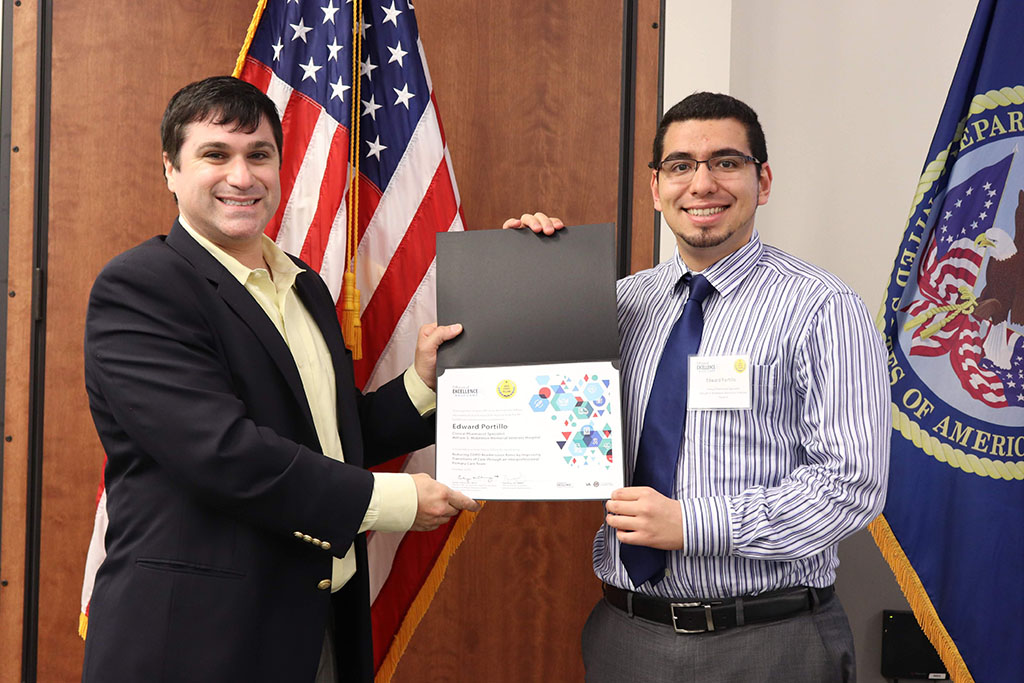
Arthur Schuna (BS ’73, MS ’75) was instrumental in expanding clinical pharmacists’ roles on local and national levels
By Katie Ginder-Vogel
To say that Arthur Schuna (BS ’73, MS ’75) made an impact on his patients during his 41-year career at the William S. Middleton Veterans Memorial Hospital in Madison, Wis., would be a flagrant understatement. The patients themselves showed their appreciation, above and beyond the usual thank-yous.
“So many patients seemed to light up when you’d walk in the room,” Schuna says. “One patient made elaborate birdhouses and gave one to me that looked like a covered wagon, and on it was painted, ‘Doc Schuna’s wagon.’ Another patient, who was a painter, did a portrait of me in oil and gave it to me. It was really touching.”
His impact on the profession itself is felt just as deeply. Schuna has long been a leader in ambulatory care pharmacy, leading the development of multiple ambulatory roles for pharmacists at the Madison VA and creating one of the first ambulatory care pharmacy residencies in the country.
These contributions haven’t gone unnoticed: Schuna was named a fellow of the American Society of Health-System Pharmacy (ASHP) in 1994, received the Winston Durant Award from UW Hospital in 2004, a Pharmacy Residency Excellence Preceptor Award from the ASHP Foundation in 2007, and a Citation of Merit from the University of Wisconsin–Madison School of Pharmacy, his alma mater, in 2019.
“My goal was to become a direct patient care provider with personal responsibility for my actions, not just a therapeutic advisor.”
—Arthur Schuna
His career has been centered on patient care, and that’s what first piqued his interest in pharmacy as a youth in Clear Lake, Wis., where he frequented Chet Johnson & Sons Pharmacy in Amery and observed the pharmacists’ close connections with their patients. As an undergraduate at the School of Pharmacy, Schuna interned at Werts’ Pharmacy on Monroe Street in Madison (now Neuhauser Pharmacy).
“That was a valuable experience, but I began to hear about things going on in other areas of pharmacy,” Schuna says. Listening to those rumbles of change in the profession transformed his career — and patient care along the way.
Patient-driven focus
One of the emerging areas of practice that caught Schuna’s eye as a student at the UW–Madison School of Pharmacy was clinical pharmacy, wherein pharmacists in hospitals, clinics, and other healthcare settings collaborating with physicians to optimize patient medication therapy and provide direct patient care.
“School of Pharmacy faculty were just beginning to develop pilot projects for ambulatory, or outpatient, practice models, but the limiting factor was that in a traditional pharmacy setting, you don’t have access to patients’ medical records or labs,” Schuna explains. “When you have access to all that, you can target things better and help patients more.”

In 1972, he heard about how the Indian Health Service (IHS) eliminated paper prescriptions, instead adding drug orders to patients’ medical charts, so pharmacists could access their patients’ medical records when they filled prescriptions. In 1973, he read a journal article that detailed a new pharmacist-led therapeutic monitoring program at the Cass Lake, Minn., Indian Reservation’s clinic.
Excited by the IHS’s advances in ambulatory care, Schuna began looking at options to practice clinical pharmacy after graduation.
“I talked to my faculty advisor David Angaran, the School of Pharmacy’s first clinical professor, and he suggested looking at the UW–Madison health-system pharmacy master’s degree and residency program, so I applied,” Schuna says. “This was my way to get into clinical practice.”
Schuna appreciated having numerous opportunities to teach during his residency, including co-teaching a therapeutic controversies course.
“It became ingrained that education was an important part of my training and something I wanted to pass on to others,” Schuna says. “I have taught ever since because I enjoyed it.”
Transforming ambulatory care
While Schuna was completing his master’s degree and residency, C.A. “CAB” Bond joined the School of Pharmacy faculty. For his clinical practice, he chose the rheumatology clinic at the William S. Middleton Veterans Memorial Hospital, in collaboration with Roberta Monson, the associate chief of ambulatory care and head of the hospital’s rheumatology clinic. Monson was so pleased with Bond’s contributions that she requested and received funding to create a position to oversee the development of a larger ambulatory care practice with new services.
“When this position opened, I thought, if you can develop ambulatory care services in the IHS, you should be able to do so in other government agencies, like the VA,” says Schuna. “In both settings, the patient record is there, and the pharmacy is part of the program, so all patient care was coming out of one place — it wasn’t fragmented. I applied for and got the job.”
Schuna supported the physician staff, and he often joined medical residents, learning new skills along the way.
“I viewed myself as part of a team to provide good care for patients,” says Schuna. “My goal was to become a direct patient care provider with personal responsibility for my actions, not just a therapeutic advisor.”
“The development of the ambulatory care program at the VA is one of my proudest career accomplishments, and close behind is directing that program.”
—Arthur Schuna
Later, Bond became interested in psychiatry, and transferred to the VA’s psychiatry clinic to become one of the first psychiatric pharmacists in the country. Bond handed off the rheumatology clinic to Schuna.
“I reviewed meds with patients, talked with them about how they were doing, and worked with physician staff to come up with a plan for patient care,” Schuna says. “I refined rheumatology roles to use physical assessment skills to assist in therapeutic decisions.”
Over time, Schuna absorbed the enormity of the issue of hypertension throughout the VA. It was the most common diagnosis in patients’ medical records, he says.
“Patients were going to the ER, and their blood pressure would be sky high. They’d be put on meds and come back to the ER a few months later. The ER was acting like a hypertension clinic, to some degree,” he says. “We wanted that to stop and instead follow up with those patients to manage their condition. Hypertension was a natural place for me to go next.”
Schuna developed and expanded the VA’s ambulatory care services and developing direct patient care practice roles in the rheumatology and hypertension clinics, and later developed a diabetes practice. He also taught at the School of Pharmacy, beginning as a clinical instructor in 1975, officially joining the faculty as an assistant professor in 1978, and retiring as a full professor in 2016.
Schuna began thinking about establishing a residency program, hoping it would make it easier for pharmacists who wanted to pursue this career path to transition from student to practitioner.

“I requested that the ASHP Commission on Credentialing, which sets standards for all accredited pharmacy residencies, develop a residency in ambulatory care,” Schuna says. “Within a year, the Commission had accreditation standards written, and I requested funding for a pharmacy residency. We were granted two residency positions and were one of the first two ambulatory care residencies to be accredited in the country.”
In 1983, eight years after starting his practice in hypertension and rheumatology, Schuna began directing the new residency program, which included rotations in every clinic with pharmacy services: hypertension, hypertension research, rheumatology, psychiatry, anticoagulation, geriatrics, allergy, and pain management.
“When I developed the residency, I made sure teaching was a key part of our training,” Schuna says. “It was an asset in recruiting, as not many residencies had that.”
Schuna trained 164 residents during his time as director.
“The development of the ambulatory care program at the VA is one of my proudest career accomplishments, and close behind is directing that program,” Schuna says.
Shaping the profession
In addition to his full-time work, Schuna was a member of the ASHP Commission on Credentialing. He conducted residency site surveys throughout the U.S. from 1984 to 2000.
“It was rewarding to review programs, judge how they were doing compared to the standards, and make suggestions for improvement,” Schuna says. “It was probably the most rewarding professional service I did, as you could see programs make changes that hopefully resulted in better training for pharmacists.”
Schuna chaired the ASHP Primary and Ambulatory Care Special Interest Groups, which aimed to promote specialty practice in the profession by providing networking opportunities. Each section had programming that they developed for meetings. As chair, Schuna invited group members to write letters of support of ambulatory care as a specialty.
“It was rewarding to review programs, judge how they were doing compared to the standards, and make suggestions for improvement.”
—Arthur Schuna
“After the Board of Pharmacy Specialties approved the Ambulatory Care specialty, I worked with APhA (American Pharmacists Association) and ASHP staff to develop a prep course for the Board exam and was on the team that provided two-day workshops for pharmacists interested in taking the exam,” Schuna says.
He served on the pharmacy residency advisory group that develops policies and provides recommendations for VA residencies nationally. He helped develop ambulatory care residency standards and the petition for board certification of ambulatory care pharmacists with the Board of Pharmacy Specialties.
Drawing on his clinical experience, Schuna wrote the rheumatoid arthritis chapter for 10 editions of the Pharmacotherapy: A Pathophysiology Approach textbook and has co-authored more than 40 papers published in peer-reviewed scientific journals.
“That research mostly came from questions that arose in the clinic and involved collaborative efforts among teams of people,” Schuna says. “Some also came from projects residents did during the year, because my goal was to get them published.”
Beyond pharmacy
When Schuna retired after 41 years at the Madison VA, he did so to care for his wife, who had dementia and passed away in 2020.
“It was my goal to keep her in the house as long as possible, and it turned out to be the rest of her life,” he says.
Schuna says he always cultivated hobbies outside of pharmacy, like cooking. He loves to cook Chinese food, bake pies, and make bread. He visits the public library constantly and loves watching old films, especially film noir.
You can tune in to appreciate another of Schuna’s passions: music. He began collecting records in high school, and he has been sharing his vast collection every other Saturday night for the past 28 years on his radio show, Two For the Blues, on WORT-FM in Madison.
“It’s nice to choose where I want to be and when,” says Schuna. “I have a lot of different interests: I cultivated many hobbies over my working life, so I would know how to retire. It seems I did it right.”

